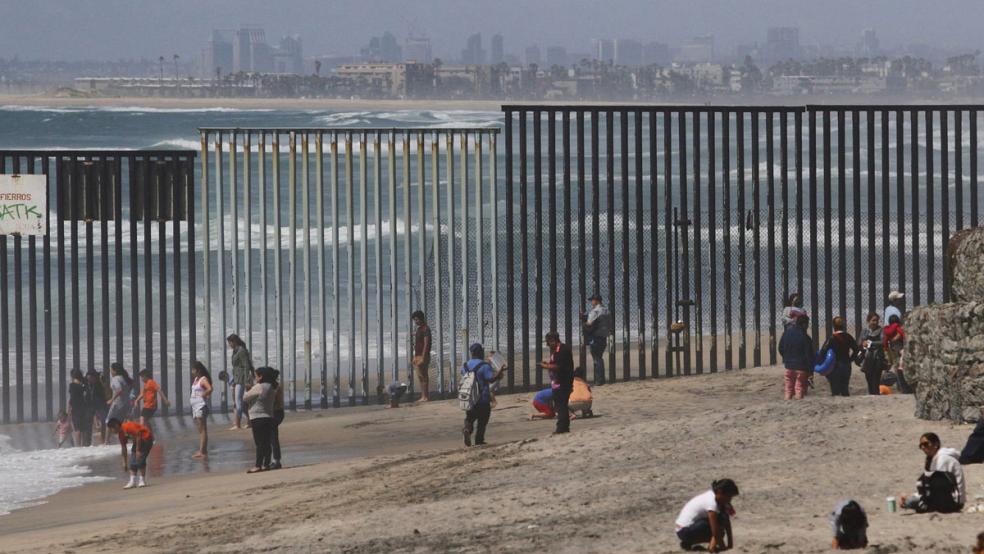The original plan for President Trump’s border wall, repeated ad nauseam on the campaign trail, was that it would be paid for by Mexico. Eventually, when the Mexican government made it clear that they wouldn’t be cutting a check to the US Treasury, the claim shifted. Mexico would still be paying for the wall, Trump and his supporters said, but indirectly, through changes to trade agreements, taxes on remittances, or other means.
On Sunday, though, Attorney General Jeff Sessions floated a different idea. The wall, he suggested, could pay for itself.
Related: Trump May Try to Weed Out Immigrants Who Cost Taxpayers $279 Billion Annually
In an appearance on ABC’s This Week, Sessions insisted that a more secure border would result in savings to the Treasury that would cover most or all of the cost of the president’s border wall.
“It will save us billions of dollars, because the numbers of people that are coming will be reduced dramatically,” Sessions said. “The amount of drugs entering our country will be reduced. The number of people we are housing in detention centers will be declining. We're going to get people out of the country to these countries that aren't taking them back after they're due to be deported. It's going to save us hundreds of millions, billions of dollars.”
He said that by eliminating what he described as $4 billion in excess tax credits wrongly paid out to people who he described as “mostly Mexicans” the country would save tens of billions of dollars.
“Well, we're going to get paid for it one way or the other. I know there's $4 billion a year in excess payments, according to the Department of the Treasury's own inspector general several years ago that are going to payments to people -- tax credits that they shouldn't get. Now, these are mostly Mexicans. And those kind of things add up -- $4 billion a year for 10 years is $40 billion. There are a lot of ways we can find money to help pay for this.”
Related: Trump’s Wall, By One Estimate, Could Cost $70 Billion
Sessions said there are unspecified “other things that we can do at the border” and “ways that we can deal with our trade situation” that would also create revenue to fund the wall.
However, not long after Sessions appearance, the president fired up his Twitter account to blast Democrats and insist that “eventually” and “at a later date,” Mexico will be paying for the wall “in some form.”
The Democrats don't want money from budget going to border wall despite the fact that it will stop drugs and very bad MS 13 gang members.
— Donald J. Trump (@realDonaldTrump) April 23, 2017
Eventually, but at a later date so we can get started early, Mexico will be paying, in some form, for the badly needed border wall.
— Donald J. Trump (@realDonaldTrump) April 23, 2017
The question of how the government will pay for the construction of the president’s wall is particularly salient right now, because last week White House Office of Management and Budget Director Mick Mulvaney told Congress that the White House would demand a “down payment” on the wall be part of a must-pass piece of spending legislation currently being debated in Congress.
Related: Will Trump’s Tax Plan Really Pay for Itself?
There’s no doubt that immigrants – both legal and illegal – cost US taxpayers a serious amount of money annually: $279 billion according to a report by the National Academies of Sciences, Engineering and Medicine. The average per capita government outlay was $15,908 compared with per capita tax receipts of only $10,887. But calculating how many people would be prevented from entering the US because of the wall would be guesswork.
The Looming Government Shutdown
Much of the federal government will be forced to shut down on Saturday unless Congress passes and Trump signs a bill extending the authority of the executive branch to spend money.
In an appearance on Fox News Sunday, Mulvaney reiterated an offer that the administration made last week: a dollar-for-dollar agreement on funding for the wall and for subsidies currently being paid out under the Affordable Care Act to help low-income Americans afford health insurance. Democrats, who are uniformly opposed to spending on the wall, have characterized the White House as holding health care hostage, something Mulvaney forcefully rejected.
“We are asking for our priorities,” Mulvaney told host Chris Wallace. “I would say that they’re holding hostage national security. Again, something they’ve supported in the recent past when President Obama was in the Senate. So we don’t understand why this is breaking down like this.”
Mulvaney was referring, somewhat disingenuously, to the Secure Fence Act of 2006 which passed with Democratic support. That bill, however, was far less ambitious than what Trump is proposing in terms of both its scope and its price tag.
Related: Republicans Are Trying Again on Obamacare Repeal: Here’s the New Plan
What Mulvaney refused to do, though, was promise a presidential veto of a spending bill that doesn’t contain funding for the wall.
“We don’t know,” he told Wallace, adding that he wasn’t going to be drawn into a debate about it on national television.
Asked on Meet the Press if the president would veto a spending bill that didn’t provide dedicated funding for the wall, White House Chief of Staff Reince Priebus was also reluctant to give a straight yes-or-no answer.
“I think that as long as the president's priorities are adequately reflected in the CR and it allows us to get moving with an increase in military spending, and a rebuilding of our military as he promised in one of your bullet points, and there's enough as far as flexibility for the border wall and border security, I think we'll be okay with that,” he said.





